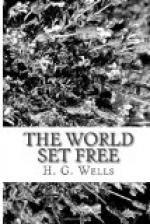As the sun sank westward the spectacle must have become a little indistinct because of a golden haze; everything must have become warmer and more glowing, and because of the lengthening of the shadows more manifestly in relief. The shadows of the tall churches grew longer and longer, until they touched the horizon and mingled in the universal shadow; and then, slow, and soft, and wrapping the world in fold after fold of deepening blue, came the night—the night at first obscurely simple, and then with faint points here and there, and then jewelled in darkling splendour with a hundred thousand lights. Out of that mingling of darkness and ambiguous glares the noise of an unceasing activity would have arisen, the louder and plainer now because there was no longer any distraction of sight.
It may be that watcher drifting in the pellucid gulf beneath the stars watched all through the night; it may be that he dozed. But if he gave way to so natural a proclivity, assuredly on the fourth night of the great flank march he was aroused, for that was the night of the battle in the air that decided the fate of Holland. The aeroplanes were fighting at last, and suddenly about him, above and below, with cries and uproar rushing out of the four quarters of heaven, striking, plunging, oversetting, soaring to the zenith and dropping to the ground, they came to assail or defend the myriads below.
Secretly the Central European power had gathered his flying machines together, and now he threw them as a giant might fling a handful of ten thousand knives over the low country. And amidst that swarming flight were five that drove headlong for the sea walls of Holland, carrying atomic bombs. From north and west and south, the allied aeroplanes rose in response and swept down upon this sudden attack. So it was that war in the air began. Men rode upon the whirlwind that night and slew and fell like archangels. The sky rained heroes upon the astonished earth. Surely the last fights of mankind were the best. What was the heavy pounding of your Homeric swordsmen, what was the creaking charge of chariots, beside this swift rush, this crash, this giddy triumph, this headlong swoop to death?
And then athwart this whirling rush of aerial duels that swooped and locked and dropped in the void between the lamp-lights and the stars, came a great wind and a crash louder than thunder, and first one and then a score of lengthening fiery serpents plunged hungrily down upon the Dutchmen’s dykes and struck between land and sea and flared up again in enormous columns of glare and crimsoned smoke and steam.
And out of the darkness leapt the little land, with its spires and trees, aghast with terror, still and distinct, and the sea, tumbled with anger, red-foaming like a sea of blood....
Over the populous country below went a strange multitudinous crying and a flurry of alarm bells... .
The surviving aeroplanes turned about and fled out of the sky, like things that suddenly know themselves to be wicked....




